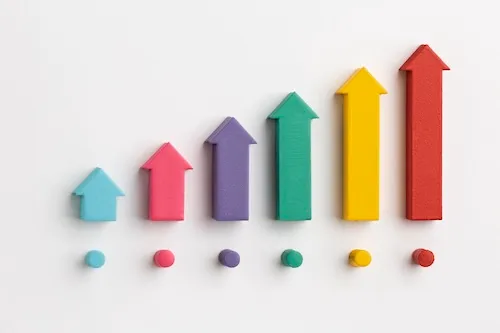Do you have more self-help books on your nightstand than novels?
Have you found yourself subscribing to yet another wellness newsletter while still working through a backlog of unread mental health podcast episodes?
When was the last time you felt truly “enough” – without the nagging feeling that you should be doing more, being more, or achieving more?
If these questions make you shift uncomfortably in your seat, don’t fear – that’s why this blog is covering an increasingly common issue: self-improvement addiction.
Every day, we’re bombarded with messages about self-improvement from every direction. As a thriving social impact community, we’ve observed a concerning trend: the very tools meant to help us grow are sometimes the ones holding us back.
The Hidden Costs of Constant Self-Improvement
Picture this: you think you’re on top of your personal development. Your morning routine includes meditation, journaling, affirmations, and a workout – all before 7 AM. Your podcast queue was filled with the latest mental health podcast episodes, and your Instagram feed was curated with motivational speakers and wellness influencers. On paper, you’re doing everything “right.” Yet, she felt more exhausted and less fulfilled than ever.
This story reflects a growing phenomenon in our wellness-obsessed culture: self-improvement addiction. As a leading platform for social impact, we’ve noticed this pattern emerging more frequently among our community members – highly motivated individuals who unknowingly fall into the trap of toxic productivity.
The statistics are telling:
- A growing number of professionals report experiencing burnout – even while pursuing self-improvement goals
- The global personal development market has exploded in recent years to match
- Social media mentions of “self-improvement” have exponentially increased since 2019
But here’s the uncomfortable truth: The self-improvement industry often profits from our insecurities.
Each new product, course, or program promises to fix what’s “wrong” with us, creating an endless cycle of seeking and striving. The result? A generation of people who are paradoxically more stressed about becoming less stressed.
The signs of self-improvement addiction can be subtle but significant:
- Feeling guilty for taking breaks or “doing nothing”
- Constantly comparing your progress to others
- Viewing rest as a weakness rather than a necessity
- Collecting self-help resources without implementing them
- Believing happiness lies in the next achievement or milestone
As a social impact community, we’ve witnessed how this relentless pursuit of better can lead to what psychologists call “improvement fatigue” – a state where the very act of trying to improve becomes detrimental to our wellbeing.
The pressure to optimize every aspect of life – from sleep to social interactions – has created a new form of anxiety that’s particularly insidious because it masquerades as motivation.
Think of it like gardening: You can’t force a plant to grow by pulling on it. Growth requires the right conditions, proper timing, and, most importantly, periods of rest. Just as a garden needs both sunlight and darkness, our personal development needs both active pursuit and passive integration.
Breaking the Perfectionism Cycle
Does this sound like your life?
You’re listening to your favorite mental health podcast, and the host is describing their “perfect” morning routine.
Green juice? Check.
Two-hour workout? Check.
Meditation, journaling, and goal-setting before sunrise? Triple check.
Your heart sinks as you glance at your own coffee-fueled, slightly chaotic morning, and that familiar feeling of “not enough” creeps in.
Welcome to the perfectionism trap – where the pursuit of excellence transforms into an exhausting game of endless comparison and self-criticism.
The Perfectionism-Anxiety Loop
As a social impact platform dedicated to authentic wellness, we’ve identified what we call the “perfectionism-anxiety loop”:
- Set impossibly high standards
- Fall short of these standards (because they’re impossible)
- Experience feelings of failure and inadequacy
- Double down on self-improvement efforts
- Repeat
This cycle is particularly dangerous because it often disguises itself as ambition or drive. Within our social impact community, we’ve seen how social media amplifies this pattern, creating a highlight reel of “perfect” lives that sets unrealistic benchmarks for personal growth.
Breaking Free: Practical Steps
Embrace the B+ Life
Instead of aiming for perfection in everything, choose your battles. Does your meditation practice really need to be Instagram-worthy? Does your journal need to look like a work of art? Sometimes, good enough is actually perfect.
Practice Strategic Incompetence
Yes, you read that right. Our social impact community encourages members to intentionally let some balls drop. You don’t have to excel at everything, and that’s not just okay – it’s healthy.
Audit Your Social Media
Take a hard look at your following list. Are those “inspiration” accounts actually making you feel inspired, or are they feeding your perfectionist tendencies? Many members of our platform for social impact report feeling lighter after unfollowing accounts that trigger comparison.
Set Boundaries with Self-Improvement
Schedule specific times for personal development activities, just as you would for work or exercise. Listen to that mental health podcast during your commute, but then switch to music. Read that self-help book for 30 minutes, but then pick up a novel.
Embracing Self-Compassion in Your Growth Journey
Listen to any mental health podcast these days, and you’ll likely hear the term “self-compassion.”
But in a culture that often equates self-criticism with internalized motivation, how do we actually practice it?
The Self-Criticism Trap
Let’s be honest: how often have you told yourself something you’d never dream of saying to a friend?
- “I should be further along by now”
- “Everyone else has it figured out except me”
- “I’m not trying hard enough”
- “I’m falling behind”
These harsh internal dialogues often masquerade as motivation. But here’s the scientific truth: self-criticism actually inhibits our ability to grow and change.
Rewriting the Story: From Critic to Ally
So, how do you start to wrestle back control from your self-critic? It starts with a mindset shift. Instead of seeing yourself as an enemy to be conquered, try viewing yourself as a close friend or ally.
Imagine if every time you made a mistake or faced a setback, you responded with compassion and encouragement, rather than harsh criticism. This is the essence of self-compassion.
The Power of Yet
Instead of “I’m not good enough at meditation,” try “I haven’t found my ideal meditation practice yet.” This simple linguistic shift promoted across our platform for social impact opens up possibilities rather than cementing limitations.
The Common Humanity Check
When you’re feeling behind or inadequate, remember this: every person in our social impact community – including those who seem to have it all figured out – experiences these feelings. It’s not a personal failing; it’s part of being human.
The Growth-Rest Cycle
Just as athletes need recovery periods for optimal performance, personal growth requires integration periods. Don’t see your rest days as a sign of laziness, but rather an essential part of your journey towards self-improvement.
Intentional Growth: Quality Over Quantity
In an era when every self-proclaimed life coach promises “10 steps to transform your life” or “30 days to a new you,” it’s easy to get caught up in the quantity rather than the quality of our self-improvement efforts.
Think about your current personal development activities:
- Are you clear on why you’re doing each one?
- Do they align with your core values?
- Are they serving your authentic goals or someone else’s vision of success?
Many of us try to achieve great things yet are overwhelmed by a checklist approach to personal growth:
- Morning routine ✓
- Gratitude journal ✓
- Meditation app streak ✓
- Fitness challenge ✓
- Personal development books ✓
But beneath these checkmarks lurked a deeper question: “Why am I doing all of this?”
The Power of Purposeful Growth
It’s time that we begin to advocate for what is called “purposeful growth” – a development that’s deeply aligned with your personal values and authentic aspirations. Here’s how to shift from quantity to quality:
The Intent Audit
Before adding any new self-improvement practice, ask:
- How does this serve my core values?
- What specific need or aspiration does it address?
- Is this timing right for this particular growth area?
- Do I have the bandwidth to integrate this meaningfully?
Quality Metrics
Instead of tracking how many personal development activities you’re doing, consider:
- Depth of engagement
- Emotional resonance
- Practical application
- Sustainable integration
- Community connection
The Value Alignment Check
Authentic growth should feel like an expansion of who you are, not a rejection of your current self. Ask:
- Does this feel like me?
- Am I doing this from inspiration or obligation?
- Would this still matter to me if no one knew I was doing it?
Creating Your Intentional Growth Plan
Once you’ve audited your current growth areas and checked for alignment, it’s time to create your intentional growth plan.
Define Your North Star
- What matters most to you?
- What kind of impact do you want to have?
- What does “growth” mean in your own terms?
Choose Your Path
- Select growth activities that directly support your core values
- Consider the seasonal nature of different growth areas
- Build in reflection periods to assess and adjust
Set Meaningful Metrics
- Focus on qualitative over quantitative measures
- Track impact rather than just activity
- Celebrate depth over breadth
From Solo Journey to Shared Path: The Power of Community
Sadly, the traditional self-improvement narrative often promotes a solitary journey:
- Just you and your journal
- Solo meditation sessions
- Individual goal-setting
- Personal milestone tracking
Sure, you’re watching online videos about how to be your best self, but the process itself is largely done alone.
But what if we shifted the focus from “self” improvement to “community” improvement? What if personal growth was seen as a collective effort rather than an individual pursuit?
As a thriving social impact platform, we’ve discovered something powerful: transformation happens in the community. The most profound growth often occurs not in isolation, but in connection with others who share our aspirations for positive change.
The Community Advantage
On our platform for social impact, we’ve identified key ways that community support enhances personal development:
Shared Wisdom
When we can openly and vulnerably share our experiences, struggles, and triumphs with others, we gain valuable insights and perspectives. We learn from each other’s successes and failures, gaining a deeper understanding of ourselves in the process.
Accountability
When we set goals for personal growth within a supportive community, we are more likely to follow through. Knowing that others are counting on us and cheering us on can provide the motivation we need to stay committed to our goals.
Collaboration
In a community, we have access to diverse skills, resources, and perspectives. By collaborating with others, we can learn new ways of thinking and problem-solving, opening up new possibilities for personal growth.
Mutual Support
Being part of a community means having a built-in support system. When facing challenges or setbacks, we can turn to our community for encouragement and guidance. This sense of mutual support creates a sense of belonging and connection that is crucial for personal development.
Opportunities for Leadership
Within a supportive community, there are often opportunities for individuals to take on leadership roles. This provides valuable experience in leading and empowering others towards a common goal. By taking on leadership roles within our community, we can develop important skills such as communication, decision-making, and conflict resolution.
Networking
Being part of a community also means having access to a network of individuals with diverse backgrounds and experiences. This network can provide valuable connections and opportunities for personal and professional growth. Whether it’s finding job opportunities, collaborating on projects, or simply gaining new perspectives, networking within our community can broaden our horizons and open up new possibilities.
Are You Ready To See True Personal Growth?
The self-improvement paradox doesn’t have to be a trap. By embracing community, practicing self-compassion, and focusing on intentional growth, we can create lasting positive change – both personally and collectively.
Through our social impact community, we’re proving that the path to better isn’t about doing more alone, but about growing together with purpose and connection.
Ready to transform your growth journey from a solitary pursuit into a connected experience? Join our community at AlignUs, where personal development meets social impact, and every step forward creates positive change for all.




